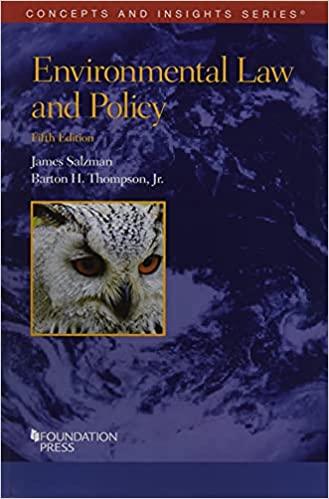Question
1.Administrative agencies have the authority to establish rules that have the force of law. true false 2.The Uniform Commercial Code is a set of laws
1.Administrative agencies have the authority to establish rules that have the force of law.
true
false
2.The Uniform Commercial Code is a set of laws governing various commercial transactions that are designed to bring uniformity to the laws of the different states.
true
false
3.Every business must comply with __________ laws.
federal
state
local
all of above
4.The laws passed by Congress and by state legislatures are called ______.
ordinances
executive orders
statutes
notices
5.Express powers are those that are specifically stated in the U.S. Constitution.
true
false
6.The commerce clause is a provision of the U.S. Constitution that grants Congress the power to regulate trade with foreign nations, and among the several states, and with the Indian tribes.
true
false
7.The U.S. Constitution confers express and _______ powers on the government.
implied
corporate
unlimited
criminal
8.Freedom of speech is covered under which Amendment?
First Amendment
Second Amendment
Fourth Amendment
Sixteenth Amendment
9.An agency, in performing its duties, can regulate economic matters such as price, entry into a particular geographical area, or entry into a particular kind of business.
true
false
10.In many cases, the need for specialized expertise in a given area can usually come only from the industry being regulated.
true
false
11.In many respects, administrative agencies are like governments within a government because they combine:
legislative, diplomatic, and military functions.
legislative, executive, and judicial functions.
executive, legislative, and military functions.
judicial, diplomatic, and military functions.
12.What is a typical function of an administrative agency?
Regulating conduct of individuals and businesses.
Levying war on a country.
Negotiating treaties with foreign countries.
Declaring laws unconstitutional.
13.A person who represents another is known as an agent.
true
false
14.A principal is not liable for the torts and crimes of the agent if they are committed at the direction of the principal or while the agent is performing authorized duties during the ordinary course of the agency.
true
false
15.It is often necessary or desirable for a person or firm to be represented by another in business or personal dealings with third parties. This relationship is called a(n):
principal-agency relationship.
incorporation-agency relationship.
title-agency relationship.
third party-agent relationship.
16.The legal document formally creating an agency is called a(n):
power of attorney.
unilateral contract.
deed.
guaranty.
17.Ethical issues are multifaceted, unlike laws which typically require specific behavior.
true
false
18.A corporate code of ethics is a set of guidelines limited in compliance and enforcement to the most senior management of a corporation.
true
false
19.Beliefs and standards that are considered to be worthwhile are known as:
discretions.
morals.
ethics.
values.
20.___________ are beliefs as to what an individual or society believes is right or wrong.
discretions.
morals.
ethics.
values.
Step by Step Solution
There are 3 Steps involved in it
Step: 1

Get Instant Access to Expert-Tailored Solutions
See step-by-step solutions with expert insights and AI powered tools for academic success
Step: 2

Step: 3

Ace Your Homework with AI
Get the answers you need in no time with our AI-driven, step-by-step assistance
Get Started


